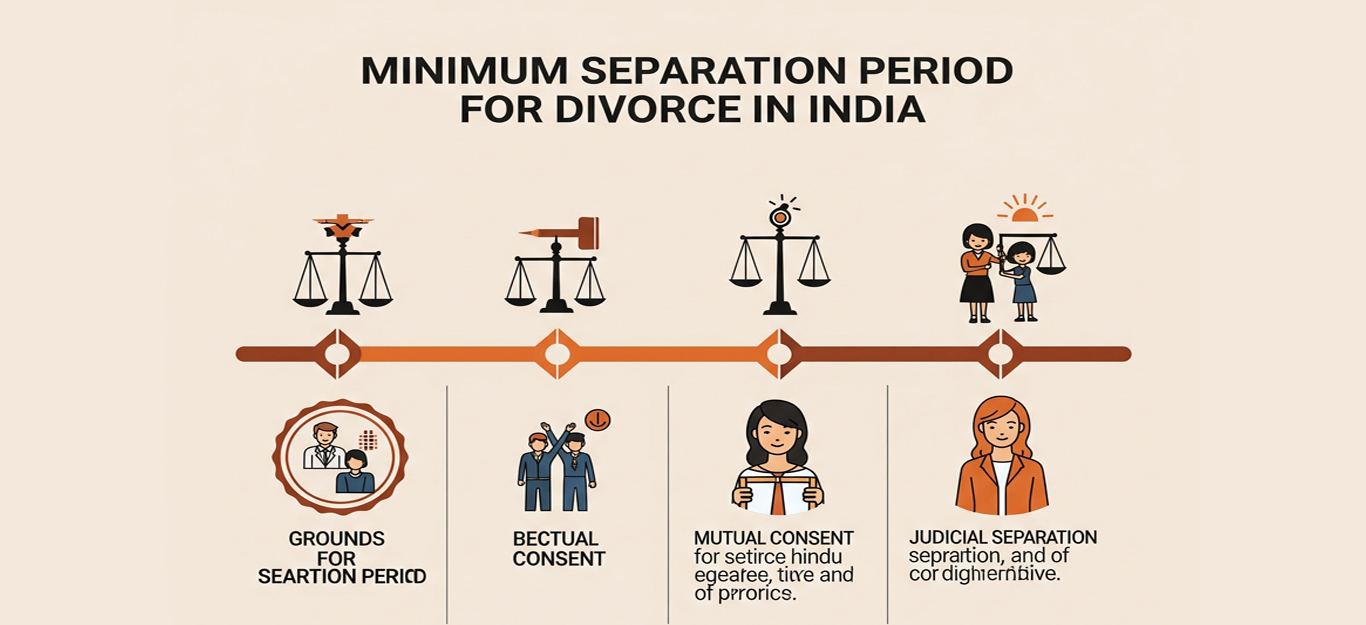
Divorce in India: What Everyone Should Know
When a marriage breaks down beyond repair, knowing your rights and the legal roadmap becomes crucial. Whether you are seeking a mutual separation or going through a contested (one-sided) divorce, understanding the minimum separation period for divorce in India and your entitlements—such as alimony, property, and child custody—is essential.
Here’s a complete guide to help you navigate the legal process, especially from the perspective of a husband.
What is the Minimum Separation Period?
In India, the time a couple must stay apart before filing for divorce depends on the type of divorce. Here is a quick overview:
| Type of Divorce |
Minimum Separation Period |
Governing Law |
| Mutual Consent Divorce
| 6 months (can be waived) |
Hindu Marriage Act, 1955 |
| Contested Divorce (One-Sided)
| Varies (e.g., 2 years for desertion) |
Hindu Marriage Act, 1955 |
| Special Marriage Act Divorce
| 1 year of separation |
Special Marriage Act, 1954 |
What is the Cooling-Off Period in Mutual Divorce?
In India, the cooling-off period refers to the mandatory 6-month waiting period under Section 13B(2) of the Hindu Marriage Act for couples filing for mutual consent divorce.
Key Facts:
- Eligibility: Couple must have lived separately for 1 year before filing.
- Purpose: To allow time for reconciliation.
However, in some cases, the Supreme Court grants an exemption to this waiting period if:
- The couple has been separated for a long time.
- There is no possibility of the two of them coming together again.
- Both spouses have agreed to fast-track the process.
So there are some situations where mutual divorce can be completed in less than the six-month waiting period.
One-Sided Divorce in India: What You Need to Know
A one-sided divorce, also called a contested divorce, happens when only one spouse wants to end the marriage. It's more complex and time-consuming than mutual divorce.
Legal Grounds for One-Sided Divorce:
Under Hindu law, these are acceptable reasons:
- Cruelty (mental or physical)
- Desertion for 2+ years
- Adultery
- Conversion to another religion
- Unsound mind or mental disorder
- Communicable diseases
- Renunciation of the world
- Presumed death (not seen for 7+ years)
Because of the complications that can arise with one-sided divorces, a
Divorce Lawyer is your best bet for a one-sided divorce.
How to Get a Divorce in India from Wife: Step-by-Step Process
Filing for divorce involves several legal steps. Here’s a simple breakdown of the process:
- Talk to a Lawyer: Consult a Divorce Lawyer in Delhi to understand your rights and how to proceed.
- Collect evidence supporting your grounds (emails, messages, witness statements, medical reports, etc.)
- Send a legal notice (optional but advisable)
- File a divorce petition in family court
- Attend court hearings and respond to any allegations
- Mediation/counseling sessions (may be ordered by court)
- Divorce Decree is passed after hearings and arguments
Rights of a Man in Divorce in India
Many men feel uncertain about their rights during divorce. Here’s what you should know:
- Right to a fair trial
- Right to file for custody of children
- Right to challenge false allegations
- Right to appeal the court’s decision
Property and Financial Rights
- Self-acquired property stays with the person who bought it.
- Joint property is usually divided as per contribution, unless otherwise decided.
- Stridhan (wife’s personal gifts/jewelry) legally belongs to her.
Note: In India, husbands do not have a legal right over the wife's property.
Alimony and Maintenance
Contrary to common belief, alimony isn’t automatic. Courts decide based on:
- Income and assets of both parties
- Standard of living during marriage
- Age and health
- Ability to earn
If the wife is financially independent, she may not get maintenance. Also, men can seek maintenance under certain laws (like Section 25 of Hindu Marriage Act).
Child Custody Rights
In India, custody isn’t gender-biased—it's about the child’s welfare.
- Mother usually gets custody of young children.
- Fathers can get custody, visitation, or joint custody depending on the case.
Major Factors That Affect Child Custody:
- Age and preference of the child
- Financial stability of each parent
- Mental and emotional fitness
- Educational and medical needs
- Relationship with the child
Conclusion: Know Your Rights, Take Informed Steps
Divorce is emotionally draining, but knowing your legal rights and the correct procedures can make the journey smoother. Whether it’s about cooling-off periods or fighting for child custody, consult a legal expert and approach the process calmly.
Pro Tip: Document everything. Keep a detailed record of all interactions, incidents, and expenses—it could be crucial in court.
